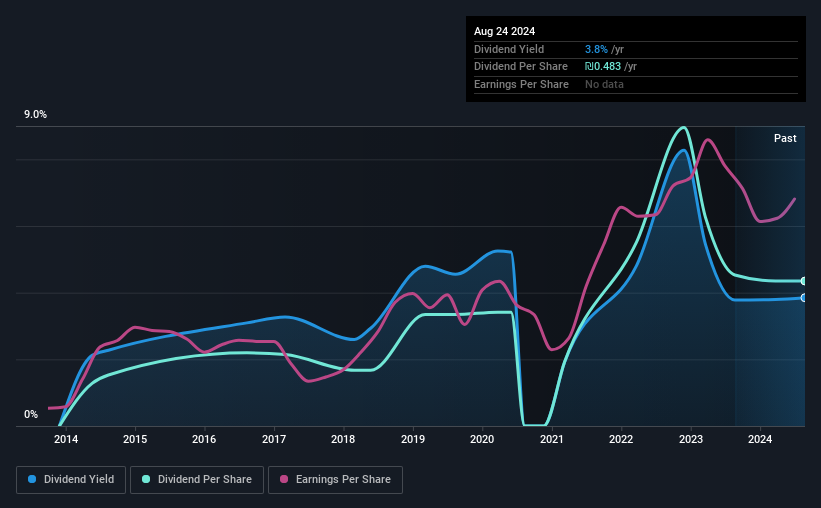Bank of Jerusalem Ltd. (TLV:JBNK) Passed Our Checks, And It's About To Pay A ₪0.367992 Dividend

Some investors rely on dividends for growing their wealth, and if you're one of those dividend sleuths, you might be intrigued to know that Bank of Jerusalem Ltd. (TLV:JBNK) is about to go ex-dividend in just three days. The ex-dividend date is usually set to be one business day before the record date which is the cut-off date on which you must be present on the company's books as a shareholder in order to receive the dividend. The ex-dividend date is important because any transaction on a stock needs to have been settled before the record date in order to be eligible for a dividend. This means that investors who purchase Bank of Jerusalem's shares on or after the 28th of August will not receive the dividend, which will be paid on the 5th of September.
The company's next dividend payment will be ₪0.367992 per share, on the back of last year when the company paid a total of ₪0.48 to shareholders. Last year's total dividend payments show that Bank of Jerusalem has a trailing yield of 3.8% on the current share price of ₪12.56. We love seeing companies pay a dividend, but it's also important to be sure that laying the golden eggs isn't going to kill our golden goose! So we need to check whether the dividend payments are covered, and if earnings are growing.
View our latest analysis for Bank of Jerusalem
If a company pays out more in dividends than it earned, then the dividend might become unsustainable - hardly an ideal situation. Bank of Jerusalem paid out just 23% of its profit last year, which we think is conservatively low and leaves plenty of margin for unexpected circumstances.
Companies that pay out less in dividends than they earn in profits generally have more sustainable dividends. The lower the payout ratio, the more wiggle room the business has before it could be forced to cut the dividend.
Click here to see how much of its profit Bank of Jerusalem paid out over the last 12 months.

Have Earnings And Dividends Been Growing?
Companies with consistently growing earnings per share generally make the best dividend stocks, as they usually find it easier to grow dividends per share. If earnings fall far enough, the company could be forced to cut its dividend. For this reason, we're glad to see Bank of Jerusalem's earnings per share have risen 11% per annum over the last five years.
Many investors will assess a company's dividend performance by evaluating how much the dividend payments have changed over time. Since the start of our data, 10 years ago, Bank of Jerusalem has lifted its dividend by approximately 13% a year on average. It's great to see earnings per share growing rapidly over several years, and dividends per share growing right along with it.
Final Takeaway
Is Bank of Jerusalem an attractive dividend stock, or better left on the shelf? When companies are growing rapidly and retaining a majority of the profits within the business, it's usually a sign that reinvesting earnings creates more value than paying dividends to shareholders. This strategy can add significant value to shareholders over the long term - as long as it's done without issuing too many new shares. In summary, Bank of Jerusalem appears to have some promise as a dividend stock, and we'd suggest taking a closer look at it.
In light of that, while Bank of Jerusalem has an appealing dividend, it's worth knowing the risks involved with this stock. To help with this, we've discovered 1 warning sign for Bank of Jerusalem that you should be aware of before investing in their shares.
If you're in the market for strong dividend payers, we recommend checking our selection of top dividend stocks.
Valuation is complex, but we're here to simplify it.
Discover if Bank of Jerusalem might be undervalued or overvalued with our detailed analysis, featuring fair value estimates, potential risks, dividends, insider trades, and its financial condition.
Access Free AnalysisHave feedback on this article? Concerned about the content? Get in touch with us directly. Alternatively, email editorial-team (at) simplywallst.com.
This article by Simply Wall St is general in nature. We provide commentary based on historical data and analyst forecasts only using an unbiased methodology and our articles are not intended to be financial advice. It does not constitute a recommendation to buy or sell any stock, and does not take account of your objectives, or your financial situation. We aim to bring you long-term focused analysis driven by fundamental data. Note that our analysis may not factor in the latest price-sensitive company announcements or qualitative material. Simply Wall St has no position in any stocks mentioned.
About TASE:JBNK
Good value with adequate balance sheet.


